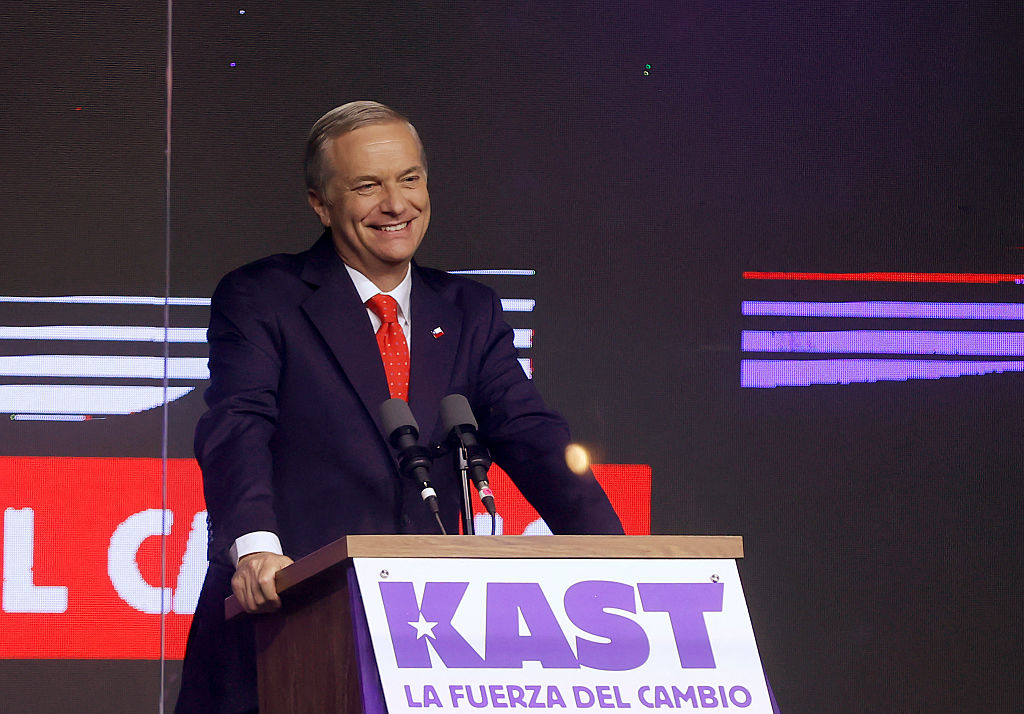
www.theamericanconservative.com
Right-Wing Candidate to Face Off Against Communist for Chile’s Presidency
Foreign Affairs
Right-Wing Candidate to Face Off Against Communist for Chile’s Presidency
José Antonio Kast bested two other right-of-center candidates to face Jeanette Jara in Chile’s second-round election.
(Photo by RAUL BRAVO/AFP via Getty Images)
Despite taking second place in the total vote count, the right-wing candidate José Antonio Kast emerged triumphant from the first round of the Chilean presidential election. Kast, who competed against a slate of other right-wingers for the chance to appear in the presidential runoff, slightly outperformed polls to take home 24 percent of the vote, just a few scant percentage points behind Jeannette Jara of the Communist Party of Chile, the left-wing unity candidate, who received 26.8 percent of votes.
Jara’s first-place finish comes as no surprise, as the only major left-wing candidate competing against a full slate of right-wing and populist candidates. Indeed, her performance is likely to be demoralizing to the Chilean left: The full force of the unified left, which was confident and even dominant just four years ago, was not able to muster the votes of even three out of 10 Chileans.
Jara’s performance was no doubt weighed down by the consistent unpopularity of the left-wing government of President Gabriel Boric, which has consistently mustered a net approval rating of minus 30 percent or worse since December 2022. His government never recovered from the complete failure of his attempt to revise the Chilean constitution in September 2022, a fiasco that saw Boric’s constitutional proposal, which would have written a litany of left-wing values and positions into the organic law of the country, defeated by 24 points.
In contrast, the right, though divided between the Catholic nationalist Kast, the traditional center-right candidate Evelyn Matthei, and the new national libertarian right represented by Johannes Kaiser, was able to pull together a hair over 50 percent collectively.
Kaiser, a new contender on the national stage who aspires to be the Javier Milei of Chile, managed a respectable performance, with roughly 14 percent of the vote for a fourth place finish. Though deprived of a surprise victory á la his exemplar next door, his National Libertarian Party continues to grow in strength, picking up two more deputies and a senator in parliamentary elections. It nevertheless remains by far the junior partner in a coalition with Kast’s Republican Party.
Matthei, a veteran politician who has served in various high-profile roles in government since the end of Augusto Pinochet’s dictatorship and ran for president in 2013, finished last of all the major candidates, with a disappointing 12.5 percent. The traditional Chilean right looks exhausted in the face of new, more energetic alternatives. Kast and Kaiser appeal to the more ideologically minded on the right; the centrist populist Franco Parisi has a strong attraction for the center-right’s traditional supporters, the more cosmopolitan urban population concerned with rising crime, illegal immigration and public disorder.
Indeed, Parisi is the standout performer this election. Though falling short of a second-round finish, Parisi received nearly double the percentage of votes anticipated by the polls, finishing in third place with 19.8 percent. A self-described liberal, Parisi has made a name for himself attacking right and left for corruption and self-dealing, a message that has apparently resonated with the Chilean populace. His program is an eclectic mix of anticorruption and government efficiency measures, programs for increasing democratic participation at all levels of government, promotion of economic development, and promises to crack down hard on crime and illegal immigration. His success is a good indicator that a sizable portion of Chileans are fed up with the country’s political class as a whole, a consistent problem in the post-Covid era when incumbents have consistently been punished by voters unhappy with the conduct of their governments.
The results of this weekend place Kast in a dominating position for the final round of the presidential election. This is Kast’s third attempt at reaching La Moneda, Chile’s presidential palace. The founder of the Republican Party of Chile, Kast is well-known for his social conservatism, including opposition to gay marriage and abortion, which have made him the favored candidate of the country’s growing Evangelical Christian bloc.
This election, Kast’s campaign focused principally on law and order, including promising to build a Trump-style border wall in the north (where illegal immigration from Bolivia and Peru has been a major issue), to conduct mass deportations, and to build maximum security prisons like those Bukele has built in El Salvador. With crime and immigration as major issues this election, he will probably be able to draw from large numbers of voters on the right that were previously in favor of Kaiser or Matthei, while also being able to pull in anti-establishment voters from Parisi’s base who are unhappy with the conduct of the current administration.
In contrast, Jara has precious few votes to win from the losing candidates. She might be able to pull in the more left-leaning portion of Parisi voters and the most moderate of Matthei’s urban base, but her association with Gabriel Boric and the perceived weakness of the left on crime are potentially insurmountable obstacles. While she has also promised to deport illegal immigrants and strengthen the border and the criminal justice system, her strongest support comes from older Chileans who associate the right with Pinochet’s dictatorship. Kast has defended Pinochet’s policies on various occasions, and his older brother Miguel served as the minister of labor in Pinochet’s government.
The second round of voting will take place on December 14, and the victor will be inaugurated in March of 2026.
The post Right-Wing Candidate to Face Off Against Communist for Chile’s Presidency appeared first on The American Conservative.










